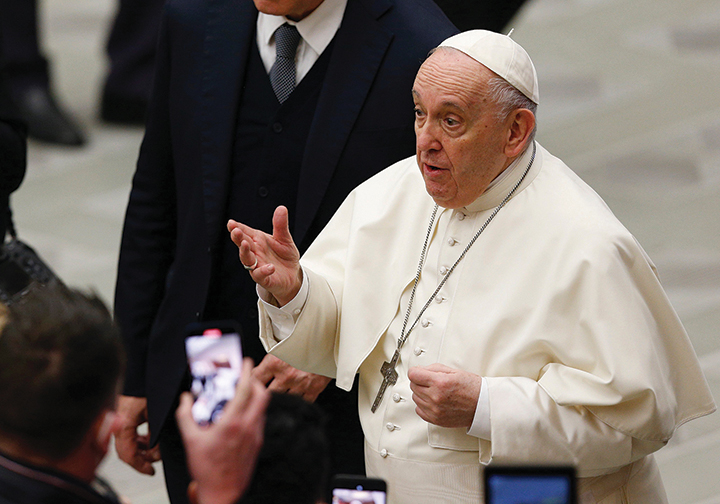
by Joe Bollig
joe.bollig@theleaven.org
KANSAS CITY, Kan. — There seems to be an art to everything these days. Waffle-making. Beard-grooming. And for those of you out there old enough to catch the reference, even motorcycle maintenance.
Now Pope Francis is calling on all Catholics to participate in a worldwide consultation and “become experts in the art of encounter.”
“Today, as we begin this synodal process, let us begin by asking ourselves — all of us, pope, bishops, priests, religious and laity — whether we, the Christian community, embody this ‘style’ of God, who travels the paths of history and shares in the life of humanity,” the pope said on Oct. 10, 2021, at St. Peter’s Basilica in Rome.
The Synod of Bishops on Synodality will take place in Rome in 2023. Its theme is: “For a Synodal Church: Communion, Preparation and Mission.”
Now, this consultative process moves to dioceses and parishes around the world.
Archbishop Joseph F. Naumann kicked off the synod process in the Archdiocese of Kansas City in Kansas with an opening Mass on Oct. 24, 2021, at the Cathedral of St. Peter.
Many Catholics may not know what a synod is.
“The process of convening a synod of bishops is really a process of fraternal collaboration among the bishops of the world,” said Father John Riley, archdiocesan vicar general and chancellor. “A synod is basically an advisory body of bishops which gives the pope a way of discussing the issues of the day and receiving feedback and advice from bishops around the world.”
Archbishop Naumann said synodality is a process that involves a community talking, listening and praying together.
“Synodality is a way of talking about how the church is called to be a community that journeys together,” he said. “It draws our attention to the synodal process that illustrates, really, the mission of the entire church — a people journeying together, not each of us going our own way, but attempting to follow the One who is the way, truth and life.”
The pope has asked every bishop to engage in the process of gathering information for the synod through consultation with clergy, laity, the Catholic faithful and non-Catholics. In the archdiocese, the consultation will primarily consist of listening sessions.
“We’ve already done quite a bit of work in the archdiocese,” said Father Riley. “We’ve communicated to all the pastors in all 107 parishes. We’ve sent them the questions to be used for consideration in speaking to whatever groups they want to engage. . . . [How the process is conducted] will look differently, I presume, for each parish depending on the size and demographics of the parish.”
The pastors don’t have to use all the suggested listening session questions. They serve as a guide. Parishes and ministries should focus on the questions most pertinent to them.
The parish groups pastors choose for the consultation process could include pastoral councils, finance councils, Enflame evangelization teams, parish formation groups, Knights of Columbus, altar societies or sodalities, youth groups, prayer groups, Hispanic or other ethnic groups, ministries or others. Individual parishioners who want to participate, but may not belong to these groups, should contact their pastor.
“Once [pastors] have consulted their respective groups in their parishes, they will consolidate all that input into one report for their parish to upload into our archdiocesan website,” said Father Riley. “We’re looking for one report per parish. They’ll have to consolidate all their responses and synthesize their discussions to get some general themes about the questions we’ve sent for discussion.”
In addition to the parishes, other entities and ministry groups will be involved in the synod consultation process. These include religious communities, Catholic campus centers at colleges and universities, high schools and Catholic Charities.
“I think it’s important to note that [the synod] is not something that seeks to change church teaching on issues or the way the church views this or that matter,” said Father Riley. “It provides, if you will, a lens for the church to look through to better live out and articulate the truths contained within the Catholic Church and her teaching, and to carry out the mission of the church in the world.”
The deadline for all parishes and other entities or ministry groups to submit their reports to the archdiocese is April 1. The archdiocesan report, which will consolidate all the parish and other reports, must submit its own report to the U.S. Conference of Catholic Bishops by June 1.
The archdiocesan report — along with those from all the dioceses in the world — will be used by the bishops who will participate in the Synod on Synodality in 2023. Eventually, that synod will produce a document.
Parish milestones
Jan. 12 – Feb. 14: Pastors decide the groups or ministries from which to gather input and schedule times and dates for in-person, video conference or electronic communication.
Jan. 10 – March 25: Parishes conduct their ministry and group meetings.
April 1: All reports must be entered into the archdiocesan website.
Question topics
Archdiocesan synod consultation questions are grouped under 10 topics:
1. Listening
2. Speaking out about our faith
3. Divine worship
4. Exercising responsibility for our Christian mission
5. Inclusion
6. Participation
7. Decision-making
8. Formation
9. Dialogue in church and society
10. Other communities of faith







As the Universal Church is about to embark on the synodal journey,process should involve the local Churches, in different phases. The pope is scheduled to formally open the synod process at the Vatican to and hearing one another in all facets of church life.